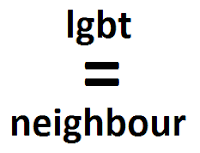Q.
A friend of mine told me that he sometimes debates about how much to talk about lgbt matters from the pulpit, or if it is just better to talk about love and inclusion in general.
Here are some thoughts I have in response to that question:
1.
 First, there are times when for the sake of the Gospel and for the love of those whom God has made, it is necessary to take a stand and to speak up. This is especially the case when men, women and children who are made by God and loved by Him are being treated unjustly or as less than human. That doesn't mean that this is always the time or the topic; just that there are times and topics that one must speak about. It does mean that trying to be "neutral" helps the oppressor, not the victim, and in the Bible we regularly see God on the side of the victim.
First, there are times when for the sake of the Gospel and for the love of those whom God has made, it is necessary to take a stand and to speak up. This is especially the case when men, women and children who are made by God and loved by Him are being treated unjustly or as less than human. That doesn't mean that this is always the time or the topic; just that there are times and topics that one must speak about. It does mean that trying to be "neutral" helps the oppressor, not the victim, and in the Bible we regularly see God on the side of the victim.See related post on this blog.
2.
Secondly, in talking about Jesus and his interaction with others, I think it is easy for those of us who are western Christians to be generally pleased with all of that, but none of it threatens our comfort zone, the status quo today, or the privileged status of the many of us who are privileged. The things that the religious people of Jesus' day hated -- him spending time with Samaritans, women, lepers, prostitutes, and so on. -- are not relevant to us. Samaritans seem like another denomination, lepers are few and far away, etc. Somehow one needs to help people see the connection between Jesus and the marginalized persons of his day, and us and the marginalized persons of our time (the people that typically are despised and hated by the religious today).
3.
Third, especially in congregations where the parishioners are privileged, I would consider: how do I help us as a body, see the greater body that we are part of, and the systemic injustice that is around us which is affecting my brothers and sisters (even if it is not affecting me in obvious or direct ways), Are we part of the community of creation, or a little religious club?
4.
Fourthly, I would speak up and acknowledge our brothers and sisters. It is critical to break the silence and to stop the violence of dehumanizing and subhumanizing others. No more pretending that some do not exist. No more shaming. No more contributing to shame by refusing to acknowledge men, women and children whom God has made and whom He dearly loves. No more obliging people to hide, lie or "fit in" to be accepted and loved.
I remember being at a somewhat volatile church meeting which was discussing a decision (at a regional denominational level) to allow same-sex blessings. I stood up and in my comments, I referred to our gay and lesbian brothers and sisters in Christ. And at the moment of saying these words, the thought came into my mind: no one has ever said this phrase aloud before in this congregation...
And that's a reason to speak about LGBT people -- not LGBT issues but PEOPLE -- from the pulpit. To acknowledge their existence and humanity.
5.
Fifth, understand that as local congregations, we need our gay and lesbian brothers and sisters in Christ.
I'm going to say that again. The local church that you and I participate in, needs our gay and lesbian brothers and sisters in Christ. Without them, we are incomplete. The body of Christ is all of God's children. We can't pick and choose who is in and who is out. Jesus showed us this by his life of embrace, and by giving his life for all. The eye cannot say to the hand, I don't need you. Similarly, straight followers of Jesus cannot say to followers who are LGBT, we don't need you. And if we are ashamed of them, then we need to treat them with even more honour.
6.
Sixth, people don't know where you stand unless you say. If they themselves are lgbtqi, they won't know if they are welcome. They won't know if they are, to use Jeff Chu's words, "desperately and fiercely wanted". Or if it would be better to just leave now and find a better place to be part of. Those who have lgbtqi friends and relatives won't know if they can bring their friend or loved one to church, or if they can speak with you about their life together. Some will not know and others will assume wrongly, and both of these can be barriers to personal growth and community. This can also result in deadly consequences when someone who might have turned to a friend, family member of pastor for help doesn't because they do not know if they will be embraced or rejected.
R.
What are your thoughts on this? What else should be on this list? I'd love to hear your comments.
rob goetze, may 2015























